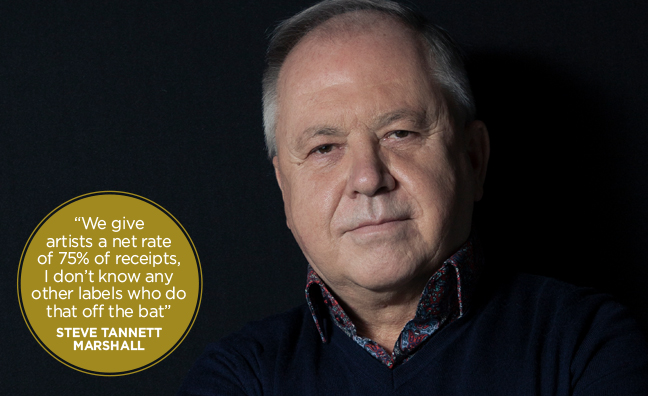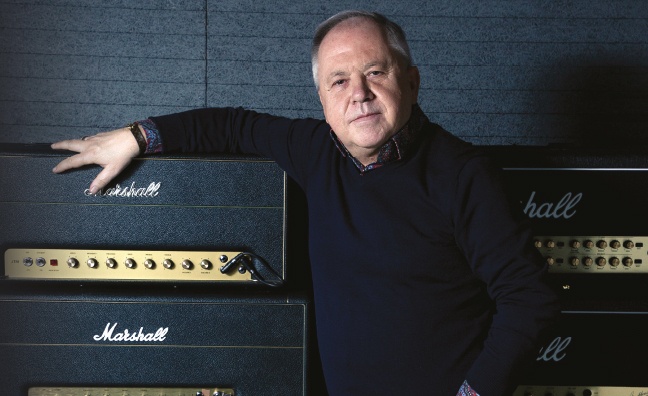Long established as an iconic music brand, Marshall celebrates its 60th anniversary this year. To mark the occasion, Music Week meets music director Steve Tannett to find out how, by branching out into recordings, live and beyond, the company is seeking to help shape a new future, not only for rock and alternative music, but the entire business…
WORDS: JAMES HANLEY
There can’t be many, if any, more evocative brand names in music than Marshall. The iconic British amp manufacturer has defined the sound of legendary guitarists, “providing the standard for the industry” (in the words of Slash, no less), for generations.
The company, which is part-owned by a charitable trust, celebrates another milestone in 2022 – its diamond jubilee. A decade on from the death of its legendary founder Jim Marshall, The Father Of Loud’s legacy remains very much intact.
“Jim’s legacy is what drives everything that we do,” Marshall Amplification music director Steve Tannett tells Music Week. “Marshall’s charitable trust status underpins the business and a certain amount of our profit goes to charity. The ethos that Jim created has run through the 60 years, that’s why we’ve always been incredibly involved with musicians across the board. Jim was a teacher, so he believed in passing on knowledge, goodwill and good fortune. Jim’s legacy is to keep giving back to musicians in whatever way we can.”
When Tannett was hired to head up the fledgling Marshall Records in 2016, it was front page news in Music Week as he outlined his vision for the label. “Our roots go back to the legends of rock. But our motivation is to find the next generation,” Tannett said at the time.
“When Jon Ellery, the MD, decided to bring me in to start Marshall Records, it was an open book,” remembers Tannett over Zoom. “They said, ‘We want to help artists, so perhaps this is a good way of doing it.’ And I said, ‘Well, the record business is a difficult business. But if you’re genuinely interested in helping artists, it is a very good way.’”
Tannett was speaking from experience. The seasoned manager, label and publishing executive started his career as an artist in punk band Menace and signed to Police manager Miles Copeland’s Illegal Records in the late 1970s, before moving to a backstage role for Copeland’s IRS Records.
Tannett has worked with the likes of REM, The Police, Duran Duran, and Black Sabbath, who he signed in the late ’80s, and spent two years guiding the career of former Cream drummer Ginger Baker prior to joining Marshall. But the exec recognised the industry’s evolution had created a need for a USP beyond the Marshall name. Laudably, Marshall offers the majority of revenue to all artists post-recoupment.
“Record labels will always be there, but you now come across a lot of artists who say, ‘I don’t want a label, I don’t need one,’” he says. “So our offering had to be something different. We’ve changed a lot of our record deals in favour of a higher split for artists. Our net rate to the artist is 75% of receipts. I don’t know any other record labels that do that off the bat. So it’s not a case of, ‘When you sell a certain amount, we’ll up your royalty rate.’ No, you sign to Marshall Records, you get 75% of net receipts.”
The arrangement is made possible, elaborates Tannett, by the makeup of the wider Marshall business (as an aside, Marshall-branded headphones, speakers, fridges, clothing, beer and bags are all manufactured under licence).
“Marshall is a very successful business, but because it has no shareholders, it hasn’t got the kind of motivations that big companies normally would, it exists in its own space,” he points out. “When we were talking about artists’ contracts, Jon Ellery said, ‘We could never make enough from it to make a dent in our global business, so it seems much fairer to let the artists keep most of the money once we’ve got our investment back.’ And I said, ‘That’s an incredibly interesting way of doing things, because people don’t do that.’ And the great thing about being Marshall is that we can do that. And we were willing to do that.”
The policy has helped the label build a burgeoning roster that includes the likes of Gallus, Therapy?, Press To Meco, Grand Slam, Rews, Bad Touch and Nova Twins.
“Nova Twins are doing extremely well,” beams Tannett. “There is a lot of interest globally and I think they are going to be a big breakthrough act for this year and next. Our relationships are with artists who have their own vision, and Nova Twins were a great fit because they were incredibly focused about what they wanted to do. They didn’t require A&R or creative input. They had their own ideas and it was a question of finding a partner that could help in areas where they needed it.”
Tannett points to Therapy?, who have been making records for 30 years, as proof of the breadth of the roster, adding that both Therapy? and Nova Twins recorded their new albums at the Marshall Studio. The state-of-the-art recording and mixing premises at Marshall HQ in Milton Keynes was opened last summer in another first for the firm.
“Nova Twins made most of their album there,” says Tannett. “Artists are not required to record there, but we built such an incredible studio that people are like, ‘We get to record here? Wow, this is fantastic.’ It really sets us apart.”
Tannett’s experience is complemented by an abundance of youth within the company.
“We have tried to design a company that is very artist-friendly. We work with [a wide range of ] talent. We have relationships with artists like Yungblud and Slash, so our A&R team is incredible at working with emerging talent and serving our existing endorser base.”
He adds: “I think we’ve got the right balance, and that means we’re not restricted [in how we operate]. Nova Twins and Therapy? are at opposite ends of the scale, but they’re both incredibly talented rock artists that have a complete agenda for what they want to do artistically. Obviously, we are a rock genre [specialist], but that doesn’t mean we would only sign rock acts.”
With recognition for its expanding offering on the rise, Tannett says Marshall is in a great place. Deep in the doldrums of the Covid-19 shutdown at the beginning of 2021, the firm handed the beleaguered live sector a boost with the Marshall Live Agency. Led by 15-year veteran Stuart Vallans, the agency has focused on emerging talent, working with acts such as Gen And The Degenerates, Crashface, Elijah Miller, Gallus, Make Friends, Moray Pringle and Polar States. Moreover, it only charges artists for the effort of the agent, rather than a flat percentage of income.
“The idea was to continue to expand the concept of Marshall as a music brand,” says Tannett. “We’ll always be a hardware brand. We are an amplifier maker, that’s what we do. But all these additional businesses have been created to enhance the experience of the artists.”

The agency was created to make it easier for developing artists to get an agent and not have to pay commissions on minimal gig fees.
“I think our agency is testament to our commitment to grassroots,” he says. “It was not set up to try and poach artists from other agents, it is there purely to find and develop new talent. We’re not here to make ourselves rich, we’re here to enhance the offering for artists across our equipment brand, our agency, our record label, and any other part of our world that we can help in.”
Rock music might not rule the world in quite the same way it did during Marshall’s formative decades, but Tannett considers the state of play to be “incredibly healthy”, singling out the global breakthrough of Bring Me The Horizon.
“It’s not rock as we knew it, and I think that’s exciting,” he offers. “Wouldn’t it be boring if rock was the same as it was 30 years ago? There’ll always be an audience for that, but there’s an incredible energy around guitar music in general, which is just breathtaking. And with so many women coming into the business, it’s incredibly exciting. Nova Twins are a good example: two female musicians absolutely at the top of their game. There are so many great artists coming through across the board, it’s not an exclusively male domain anymore, it’s for everybody.”
The business, which is launching a commitment to reduce its carbon footprint by 10% each year, has been looking at ways to deliver carbon neutral tours. Improving workplace diversity is also of uppermost importance.
“It is absolutely paramount for us in our recruitment and our attitude,” he says. “Inclusivity is everything. You can see it in our staff, in our roster and across the board at Marshall that we are a forward-moving, forward-thinking company.”
Last October, Marshall Amplification made a five-year commitment to MOBO UnSung, the MOBO Organisation’s emerging talent competition for unsigned artists. Marshall has also partnered with BBC Music Introducing Live, The Great Escape and South By Southwest, as well as collaborating with Kerrang! Radio on a project called The Deal, which offers the winning band a record deal with Marshall, airplay support and a slot at the 2022 Download Festival.
“MOBO Unsung is something truly different for us because we’re involved in a five-year partnership and we hosted a two-day event where all of the artists came to our studio,” he says. “We spent time discussing what we do and how we do things, and it was very interesting to see the parallels with these developing artists, who are not in the genre we are best known for, but the disciplines are very similar.”
Tannett’s pride in the partnership is clear and he has high praise for MOBO Awards founder Kanya King.
“Kanya is incredible,” he says. “I didn’t know her before, but I do now, and she’s extremely impressive. It’s a great pleasure to be working with her.”
Marshall, which is launching a new education platform, Marshall Industry Sessions, later this year, has big plans to mark its 60th anniversary – starting with its 24,000-capacity Hanwell Hootie free music festival in Ealing on May 7.
Indeed, as live music continues its comeback, Tannett is holding out hope that the legacy of the pandemic can ultimately be a positive one.
“The amount of artists that managed to find a way to survive the cancellation of their entire live business has brought out a new spirit in music,” he observes. “We’re seeing a resurgence of the energy of punk across all genres: it’s in Black music; it’s in pop, we’re seeing so many more young people coming into the business with incredible ideas. We are inundated with amazing artists. In fact, there are more artists than there are opportunities to record them. The resilience of the talent pool is incredible.”
And having kicked off by reflecting on Jim Marshall’s legacy, Tannett stops for a moment to ponder his own. At 65, he recently made his maiden visit to South By Southwest in Austin, Texas, where his acts Nova Twins and Gallus were on the bill.
“Marshall is unlike any other music company I’ve ever experienced,” he says. “We work hard and we play hard, we will be found at bars at festivals, enjoying a few beers and a few laughs. We love music and we love to keep that side alive.”
“I’m coming up to something like 45 years in music. I think I was 20 when I started out and I’m 65 now. If I wanted to ever be remembered for anything, it’s just for loving rock’n’roll and being part of an incredible industry. It’s a privilege, so giving back to artists is the best thing we can do.”










